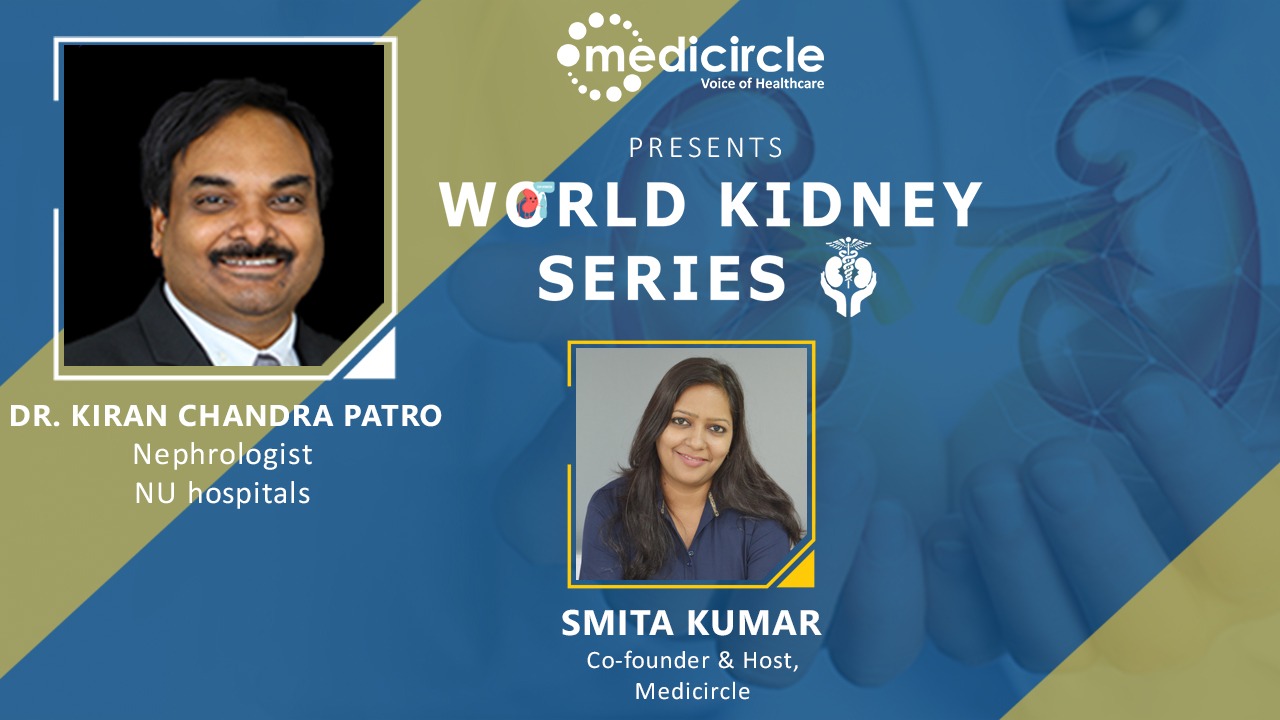Chronic Kidney Disease is a progressive condition in which kidneys don't work properly as they should, in order to filter waste, toxins, and fluids from our body which can cause serious health problems. Earlier detection of chronic kidney diseases (CKD) could slow progression, prevent complications, and even reduce cardiovascular-related outcomes. We at Medicircle are conducting a world kidney day awareness series, featuring eminent Nephrologists and Urologists from different healthcare organizations to get their views on maintaining good kidney health.
Dr. Kiran Chandra Patro is a senior consultant nephrologist at NU Hospital. He has been associated with the field of Nephrology for more than a decade. He has presented various papers and most papers have been awarded. He has published in various well-known journals and authored chapters in books. Dr. Kiran has a keen interest in educating the general public regarding renal disease and is associated with various media presentations and interactions.
Symptoms of Kidney disorder
Dr. Kiran says, “Unhealthy kidneys normally present with very vague symptoms unless there is swelling of feet, decrease in urine output, or blood in urine, or breathlessness. In the case of Chronic Kidney Disease (CKD) initially, the symptoms may be very minimal and develop later. Hence there is a need to go in for regular health check-ups, especially if they're having any risk factors like diabetes, hypertension, any heart problems, or any other associated illnesses like kidney stones.”
Diabetes “The Silent Killer”
Dr. Kiran explains, “Diabetes is the silent killer, affects each and every part of our body because it affects the small vessels. Eye vessels, Kidney vessels, Nerves vessels, Heart vessels are all affected. So, they develop diabetic retinopathy, diabetic nephropathy, diabetic neuropathy respectively. Diabetic Patients have to undergo regular follow up to take care of diabetes because that is the only thing which we can control. Control diabetes would halt the progression of these diseases to some extent.”
Factors Affecting the Renal Functioning
Talking about factors Dr. Kiran points, “CKD is very common among the general public. There are two factors that effect the functioning of kidneys.
Nonmodifiable risk factors include age, gender, family history.
Modifiable risk factors include hypertension, diabetes, obesity.
Painkillers - Long-term usage of painkillers for minor headache, backache, dental pain can cause kidney damage.
Stone diseases – Kidney stones may not cause any problem but once it moves into tubes, it can lead to renal dysfunction.
Prostate – If it does not get treated on time, this can cause problems to kidney function.
Glomerular diseases – Chronic glomerulonephritis or interstitial nephritis or reflux disease can take you to stage of renal dysfunction.”
Dialysis – Temporary Process
Dr. Kiran suggests, “When kidney has reached its end stage, Dialysis is the only option left. Dialysis acts as the support unit; it just takes care of the needs of the body that is the excretion of waste products. It is a temporary process and not a permanent cure. It has to be an ongoing process maintained over a period of time.
Forms of Dialysis
Dr. Kiran speaks about types of Dialysis,
“Haemodialysis – In this process, with the help of fistula or catheter blood is taken out from the vessels, purified, and sent back. This has to be done thrice a week.
Peritoneal dialysis – This can be of manual or automated type.
In the manual method, the peritoneal membrane is used as a filter to remove toxins and volume. It is practiced around 3-4 times a day.
In automated, Catheter is being connected to the machine. The machine will fill the abdomen with fluid and after some time it will remove the waste product. The machine is left overnight for the dialysis process to get complete.
Need of Dialysis in Pandemic
Dr. Kiran adds, “In the present situation of Pandemic, all the hemodialysis centers in the country have become extra careful. They are following all the protocols to keep patients isolated so that they don't get infections. Now that the vaccine is also out, we need to really understand that social distancing, masks, and hand hygiene is still important and should be followed.”
Patient Need to Be Extra Careful with These
Dr. Kiran listed out some useful tips -
Protein intake should be 0.6 – 0.8 /kg/day and Salt intake should be 5 gms/day.
Fruit juice, coconut water and ragi should not be taken as it contains excess of potassium. All potassium rich food should be avoided.
High BP and Diabetic patient – Carbs should be cut down including salt and sugar.
Painkillers should be avoided to halt the progression of kidney disease.
Restrict fluid intake, because due to kidney dysfunction excess fluid is not getting excreted.
Consume adequate required protein.
Taking medicine on time and regular follow up is necessary.
Boil the vegetables and dals and then drain the water out so that the micronutrients get minimised.
Kidney Function Tests
Urine analysis – this has to be check for protein leak, urine microalbumin or urine protein levels.
Creatinine - Creatinine is a marker of kidney disease. It's a waste product, which is thrown out by our kidneys. If it is not thrown, it stays back in the body, and hence any high levels of creatinine indicate a kidney problem.
So, creatine and urine analysis are very important to be monitored for all patients who are having diabetes and hypertension.
(Edited by - Renu Gupta)

 “Diabetes being the silent killer, effect each and every part of our body. Control Diabetes would Halt the Progression of CKD to Some Extent,†Dr. Kiran Chandra Patro, Nephrologist
“Diabetes being the silent killer, effect each and every part of our body. Control Diabetes would Halt the Progression of CKD to Some Extent,†Dr. Kiran Chandra Patro, Nephrologist







.jpeg)




.jpg)






.jpeg)

.jpg)




.jpg)




.png)

